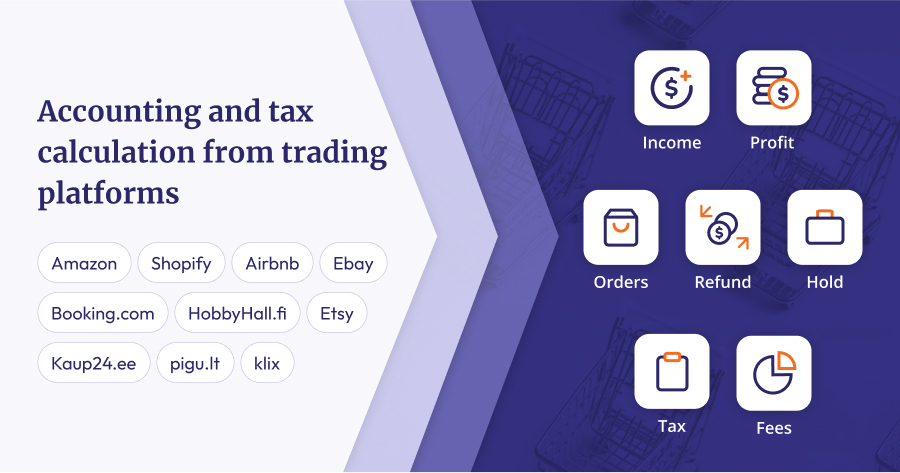
E-commerce is a form of commerce in which goods or services are sold or bought online. E-commerce platforms allow businesses to offer their products and services online and consumers to buy them via online shops, trading platforms, mobile apps, etc.
A wider audience: eCommerce platforms offer entrepreneurs the opportunity to reach a wide audience that may be difficult to reach through traditional marketing methods.
Delivery options: E-commerce platforms allow businesses to offer a variety of delivery options that can increase consumer satisfaction and loyalty.
In general, e-commerce platforms offer businesses a wide range of products, increased profitability, convenience and flexibility, access to data and analytics, as well as a variety of delivery options that can increase a business's profitability and competitiveness.
For a company that is already or is planning to engage in e-commerce, it is important to understand how value added tax (VAT) should be applied in a given situation.
The application of VAT is determined by aspects such as the place of supply of the goods, the place of residence of the recipient of the service, and whether or not the recipient of the goods or services is a registered taxable person in a particular EU Member State.
EU Member States have different VAT rates, so when selling goods/services at a distance, a non-registered taxable person will have to apply the VAT rate of that Member State.
It is important to be familiar with the concepts of distance selling or electronically supplied services. This will help to identify the type of e-commerce in which the trader is engaged.
In addition, it should be assessed whether the supply of e-commerce services does not give rise to an obligation for the trader to pay natural resources tax in the particular EU Member State where the supply of goods takes place.

Distance selling of goods within the EU is a supply of goods where the supplier of the goods (the trader) or a third party (on behalf of the trader) sends or transports the goods from Member State A to Member State B, e.g. from Latvia to Estonia.
In addition to the above, 2 conditions must be taken into account:
(a) the recipient of the goods is an unregistered taxable person, an unregistered taxable person of another Member State or a non-taxable person;
(b) the goods supplied are not new vehicles and are not goods intended for assembly or installation.
Electronically supplied services include services that are provided by means of the Internet or an electronic network and which, by their nature, are provided mainly automatically and with minimum human intervention and which cannot be provided without information technology.
Electronically supplied services are those referred to in Article 7 of Regulation 282/2011, including:
From 1 July 2021, a common VAT registration threshold of €10,000.00 has been set across the EU for transactions with individuals and non-taxable persons.
Once this threshold is reached, a trader has 2 options
a) Register in a specific Member State as a VAT taxable person and pay VAT in that Member State
b) Register under the value added tax special scheme (OSS - one stop shop), which allows traders to declare VAT - which is normally payable in several European Union (EU) countries - in only one EU country, so that the trader does not have to register for VAT in each Member State where his customers are located
In our view, it is more efficient for a Latvian company to register with the SRS Oss register for use in Latvia and submit a quarterly OSS VAT return, but each case needs to be considered on its own merits with the help of specialists in the field.
When starting e-commerce, an entrepreneur must take into account and register a website, e-shop or mobile application with the SRS as a structural unit, if:
- The goods or services are sold through these sales channels;
- Prices are displayed on the website;
- There is a payment or ordering option;
- The website displays advertising banners or links from other organisations and receives payment for this;
- Sells goods or services on platforms owned by someone else (Amazon, eBay, Etsy, Mozello, etc.)
Under Latvian law, the company must provide full details of each purchase made and produce them when requested, e.g. It is, therefore, important to correctly and accurately collect all information from the trading platforms and submit correct tax reports based on it - Euroaudit will provide you with this.

Grow your e-commerce business with Euroaudit's accounting team. We understand the financial and accounting challenges for businesses focused on e-commerce and offer guidance and support to get your books and finances in order.
When providing accounting services, we focus on aspects such as tax planning, regular financial reporting to the company's management, as well as providing advice on how to efficiently organize the flow of financial documents within the company. With Euroaudit's expertise and advanced accounting tools, you can focus on growing your e-commerce business while we take care of your accounting.
Work with us to ensure efficient, accurate and reliable accounting tailored to your e-commerce needs.
| Amazon.com | Ebay | Shopify |
| Etsy | Booking.com | Airbnb |
| HobbyHall.fi | Kaup24.ee | pigu.lt |